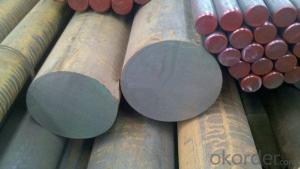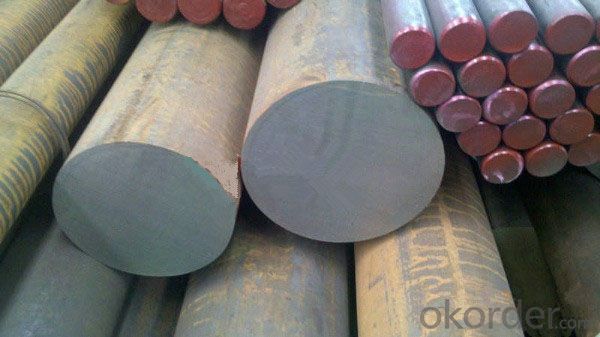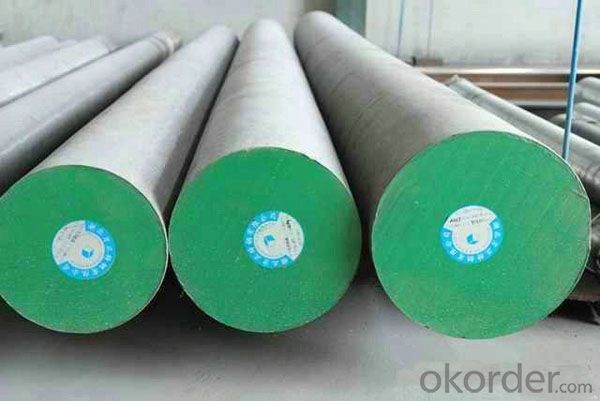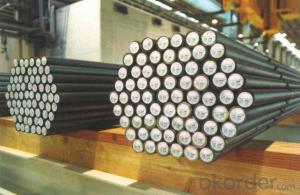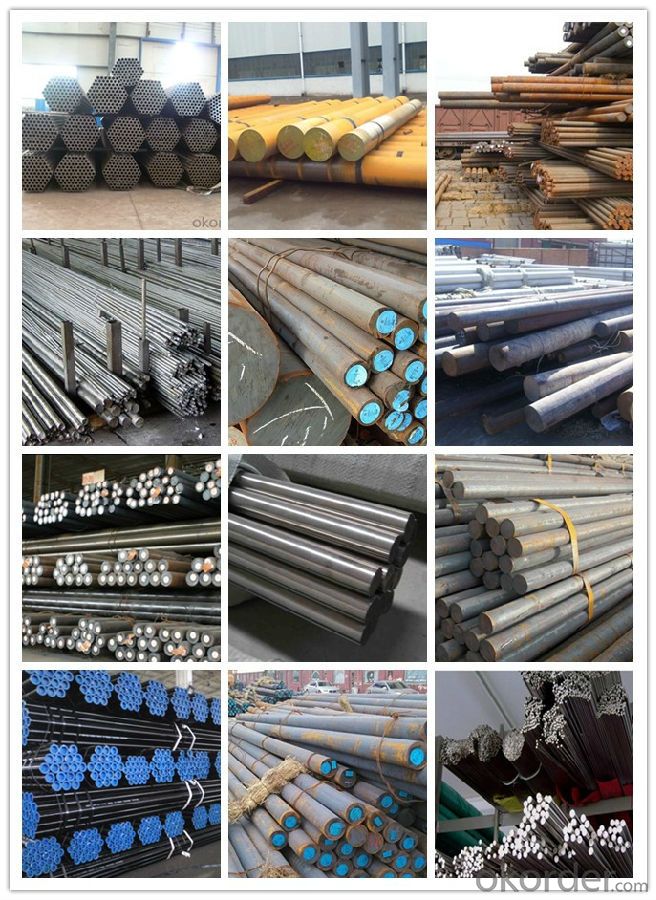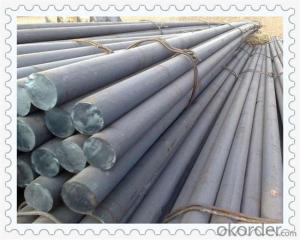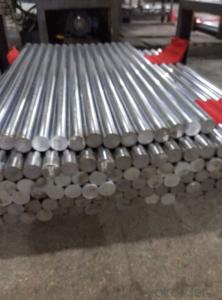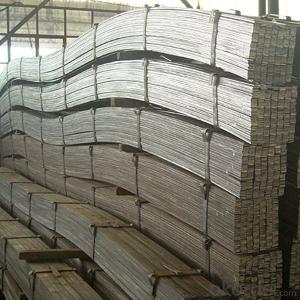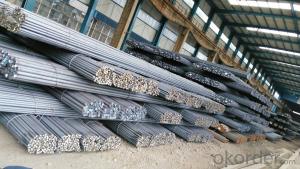Mold Material AISI D2 Hot Rolled Steel Round Bar
- Loading Port:
- China main port
- Payment Terms:
- TT OR LC
- Min Order Qty:
- 30 m.t.
- Supply Capability:
- 10000 m.t./month
OKorder Service Pledge
OKorder Financial Service
You Might Also Like
Specification
Mold material AISI D2 hot rolled steel round bar
Description:
Ledeburitic chromium cold work tool steel; with very small hardening deformations, very wear resistant, less resistant to impacts than NC11 / 1.2080, with good ductility, good cutting properties, much harder than NC10 and NC11/1.2080 due to content of molybdenum and vanadium .
Chemical composition:
Country | Steel NO. | C | Si | Mn | Cr | Mo | V | P | S | Other |
USA AISI | D2 | 1.40-1.60 | 0.30-0.50 | 0.30-0.50 | 11.0-13.0 | 0.70-1.20 | (0.80) | ≤0.025 | ≤0.025 | Co:0.60 |
Delivery condition:
Hot rolled or forging
EAF or ESR material
Black or machined surface
Available sizes:
Round bar size: 20-500mm
Thickness: 20-300mm
Width: 205-610mm
Length: 2000-5800mm
Heat Treatment:
1) Quenching temperature: 1000--1040°C
Cooling Medium: oil-cooling or air-cooling
Tempering temperature: 180-200°C, by two times
Tempering Hardness: ≥63.0HRC
2) Quenching temperature: 1060--1080°C
Cooling Medium: oil-cooling or air-cooling
Tempering temperature: 500-540°C, by two times
Tempering Hardness: ≥59.0-61.0HRC
Application:
High performance cutting tools, broaches, milling cutters, reamers, blanking dies, dies, punches, rolling rolls, tools for cutting paper, marble and plastics, cold stamping and extruding tools .
Product show
Workshop show
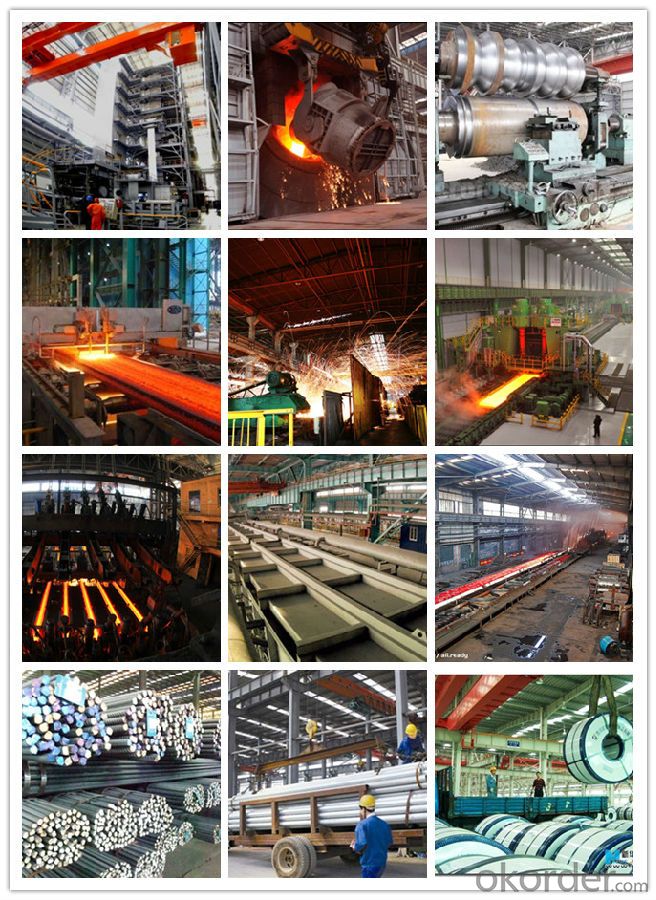
Shipping
1. FedEx/DHL/UPS/TNT for samples, Door-to-Door;
2. By Air or by Sea for batch goods, for FCL; Airport/ Port receiving;
3. Customers specifying freight forwarders or negotiable shipping methods!
Delivery Time: 3-7 days for samples; 5-25 days for batch goods.
Payment Terms
1.Payment: T/T, L/C, Western Union, MoneyGram,PayPal; 30% deposits; 70% balance before delivery.
2.MOQ: 1pcs
3.Warranty : 3 years
4.Package Informations: 1) EXPORT, In 20 feet (GW 25 ton) or 40 feet Container (GW 25 ton)
2)as customer's requirement
Why choose us?
(1) The leading exporter in China special steel industry.
(2) Large stocks for various sizes, fast delivery date.
(3) Good business relationship with China famous factories.
(4) More than 7 years steel exporting experience.
(5) Good after-sales service guarantee.
- Q: How does special steel contribute to the renewable energy industry?
- Special steel contributes to the renewable energy industry by providing durable and high-performance materials for various applications. It is used in the construction of wind turbines, solar panels, and hydroelectric power plants, enhancing their efficiency and longevity. Special steel also plays a crucial role in the manufacturing of energy storage systems, such as batteries, ensuring their reliability and safety. Overall, special steel enables the renewable energy sector to achieve higher energy output, reduce carbon emissions, and accelerate the global transition to sustainable sources of power.
- Q: How are nickel-based alloys used in the aerospace industry?
- Nickel-based alloys are extensively used in the aerospace industry due to their excellent strength-to-weight ratio, high temperature resistance, and corrosion resistance. These alloys are commonly utilized in engine components, such as turbine blades and exhaust systems, to withstand the extreme operating conditions and increase fuel efficiency. Additionally, nickel-based alloys are employed in aircraft structural parts and landing gear due to their durability and ability to withstand high stress and fatigue. Overall, these alloys play a vital role in enhancing the performance and safety of aircraft in the aerospace industry.
- Q: How does special steel contribute to the renewable energy equipment industry?
- Special steel plays a crucial role in the renewable energy equipment industry by providing the necessary strength, durability, and corrosion resistance required for various components. One of the key applications of special steel in this industry is in wind turbines. Wind turbine towers, blades, and gearboxes are all manufactured using special steel alloys due to their high tensile strength and resistance to fatigue. This enables wind turbines to withstand the harsh environmental conditions and operate efficiently for prolonged periods. Moreover, special steel is also extensively used in the production of solar power equipment. Solar panels are often framed using stainless steel, which offers excellent corrosion resistance and structural stability, ensuring their longevity and performance in outdoor environments. Additionally, special steel alloys are employed in the manufacturing of solar trackers, which enable solar panels to follow the sun throughout the day, optimizing their energy generation potential. In the hydroelectric power industry, special steel is employed in the construction of turbine components, such as blades, shafts, and casings. These components are subjected to high pressures, water flow, and abrasive wear, making the use of special steel essential to ensure their reliability and longevity. Furthermore, special steel is also utilized in the production of energy storage systems, such as batteries and fuel cells. These technologies require materials with high conductivity, corrosion resistance, and mechanical strength, making special steel alloys ideal for their construction. Overall, special steel contributes significantly to the renewable energy equipment industry by providing the necessary strength, durability, and corrosion resistance required for various components. Its utilization in wind turbines, solar panels, hydroelectric power systems, and energy storage technologies ensures the reliability and longevity of these equipment, ultimately promoting the growth and sustainability of the renewable energy sector.
- Q: What are the environmental impacts of producing special steel?
- The environmental impacts of producing special steel can include air pollution from emissions released during the steelmaking process, such as carbon dioxide, sulfur dioxide, and nitrogen oxide. Additionally, the extraction of raw materials for steel production, such as iron ore and coal, can result in deforestation, habitat destruction, and water pollution. The energy-intensive nature of steel production also contributes to greenhouse gas emissions and climate change. Proper waste management and implementation of sustainable practices can mitigate some of these environmental impacts.
- Q: Can special steel be used in the manufacturing of firearms?
- Yes, special steel can be used in the manufacturing of firearms. Special steel, such as stainless steel or alloy steel, offers enhanced strength, durability, and resistance to corrosion, making it well-suited for firearm construction.
- Q: How does hot rolling affect the microstructure of special steel?
- Hot rolling affects the microstructure of special steel by causing recrystallization and grain growth. The high temperature during the rolling process allows the steel to undergo plastic deformation, leading to the formation of new grains with a finer size. This results in improved mechanical properties such as increased hardness and strength. Additionally, hot rolling can also help in eliminating any residual stresses and improving the overall homogeneity of the steel's microstructure.
- Q: How does special steel contribute to the automotive sector?
- The automotive sector greatly benefits from the inclusion of special steel, as it contributes significantly to the manufacturing and performance of different automotive components. This steel offers numerous advantages that enhance the quality, durability, and safety of vehicles. To begin with, special steel is renowned for its exceptional strength and toughness, making it well-suited for the production of crucial automotive parts such as engine components, chassis, suspension systems, and safety reinforcements. These parts necessitate high strength to endure the strains and stresses experienced during vehicle operation, thereby ensuring passenger safety. Moreover, special steel exhibits excellent resistance to wear, corrosion, and high-temperature environments, making it ideal for the production of gears, bearings, shafts, and exhaust systems that are exposed to harsh conditions. By incorporating special steel into these components, their lifespan, reliability, and overall performance are improved, consequently reducing maintenance and replacement costs for vehicle owners. Additionally, special steel allows for vehicle lightweighting, which is a constant objective for automakers aiming to enhance fuel efficiency and reduce emissions. Special steel alloys, such as high-strength low-alloy (HSLA) steel, possess a unique combination of strength and lightweight properties, enabling manufacturers to design lighter and more fuel-efficient vehicles without compromising safety or performance. Apart from its mechanical properties, special steel also contributes to the automotive sector through its versatility in manufacturing processes. It can be easily formed, welded, and machined, thereby enabling the creation of complex shapes and designs for automotive parts. This flexibility expands the possibilities for design and allows for innovative solutions to meet the ever-evolving needs of the automotive industry. In conclusion, special steel plays a vital role in the automotive sector by providing strength, durability, and lightweight properties to various components. Its incorporation in critical parts ensures vehicle and passenger safety, while its resistance to wear and corrosion improves the longevity and performance of automotive systems. With the automotive industry's constant drive for fuel efficiency and innovation, special steel remains an essential material in shaping the future of automobiles.
- Q: What are the advancements and trends in the field of special steel?
- Recent years have seen remarkable progress and emerging patterns in the field of special steel, which have brought about revolutionary changes in various industries. The primary driving force behind these advancements is the increasing demand for high-performance materials in critical applications such as aerospace, automotive, energy, and construction. One of the major breakthroughs in the field of special steel is the development of advanced manufacturing techniques. Conventional steel production methods have been replaced by more efficient processes, such as electric arc furnaces and vacuum induction melting, resulting in improved steel quality and enhanced mechanical properties. These advancements have made it possible to produce special steels with exceptional strength, corrosion resistance, and heat resistance. Another significant trend in the field of special steel is the emergence of new alloy compositions. Researchers and manufacturers are continuously exploring and developing innovative alloying elements to enhance the properties of special steels. For example, the addition of elements like chromium, molybdenum, and vanadium has led to the creation of stainless steels with outstanding resistance to corrosion and oxidation. Furthermore, advancements in heat treatment processes have also been witnessed in the field of special steel. By utilizing advanced heat treatment techniques such as quenching and tempering, austempering, and martempering, special steels can achieve the desired hardness, toughness, and dimensional stability. These advancements have significantly broadened the range of applications for special steels, allowing them to be used in critical components that operate under extreme conditions. In addition to the progress in manufacturing and alloy compositions, there is a growing inclination towards the development of environmentally friendly special steels. With increasing concerns about sustainability and carbon footprint, researchers and manufacturers are focusing on reducing the environmental impact of steel production. This has resulted in the creation of special steels with lower carbon content, as well as the implementation of energy-efficient manufacturing processes. Moreover, the field of special steel is witnessing the integration of digital technologies and automation. The utilization of artificial intelligence, machine learning, and data analytics enables manufacturers to optimize production processes, improve quality control, and reduce costs. This shift towards Industry 4.0 is transforming the production and utilization of special steel, ensuring greater efficiency and precision in the manufacturing process. In conclusion, the field of special steel is experiencing significant advancements and trends that are fostering innovation in various industries. The development of advanced manufacturing techniques, new alloy compositions, improved heat treatment processes, environmentally friendly production methods, and the integration of digital technologies are revolutionizing the properties and applications of special steel. These advancements have not only enhanced the performance and durability of special steel but have also opened up new possibilities for its utilization in critical applications.
- Q: What are the properties of high-strength alloy steel?
- High-strength alloy steel possesses several important properties, including exceptional strength, hardness, and wear resistance. It also exhibits excellent toughness, allowing it to withstand high-stress applications without fracturing or deforming. Additionally, this type of steel often maintains its mechanical properties even at elevated temperatures, making it suitable for use in extreme environments. Finally, high-strength alloy steel typically offers good corrosion resistance, which allows it to withstand exposure to various chemicals and harsh conditions.
- Q: What are the applications of high-strength low-alloy (HSLA) steel?
- High-strength low-alloy (HSLA) steel has various applications in different industries. It is commonly used in the automotive industry for manufacturing lightweight and fuel-efficient vehicles. HSLA steel is also utilized in construction for building structures that require high strength and durability. Additionally, it finds applications in the manufacturing of heavy machinery and equipment, as well as in the production of pipelines and offshore platforms in the oil and gas industry.
Send your message to us
Mold Material AISI D2 Hot Rolled Steel Round Bar
- Loading Port:
- China main port
- Payment Terms:
- TT OR LC
- Min Order Qty:
- 30 m.t.
- Supply Capability:
- 10000 m.t./month
OKorder Service Pledge
OKorder Financial Service
Similar products
Hot products
Hot Searches
Related keywords
